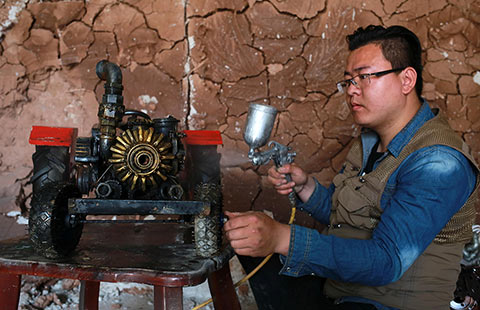Tourism revives as more Chinese tourists flock to Egypt
(Xinhua) Updated: 2016-04-19 11:14CAIRO - The number of Chinese tourists in Egypt is growing steadily and rapidly, Samy Mahmoud, head of Egypt's General Authority for Tourism Promotion told Xinhua.
"In 2014 we had almost 64,000 Chinese tourists, but by the end of 2015 we had over 125,000 visitors from China," Mahmoud said in an interview with Xinhua.
The official expected that the number will rise to 200,000 in 2016 as almost 15 regular and charter flights come to Cairo, Luxor and Hurghada per week.
Mahmoud revealed that his authority contacted the Chinese ambassador to Cairo and asked him to work on allowing Chinese airlines work in Egypt, adding "it will be a great chance to the Chinese airlines to work in the Egyptian market."
He said that most of Chinese tourists go to classic areas such as the Giza pyramids, the Egyptian Museum and Upper Egypt's ancient temples.
The official said there are many travel agencies in Egypt working with the Chinese tourism operators, adding there are many offers for Chinese tourists, especially after the charter flights started.
"I can say that one week costs around $700, and I think such a price is good for Chinese people," he said.
Tourism in Egypt was dealt a heavy blow following the Russian airplane crash in North Sinai in October, after which several countries, including Britain and Russia, suspended their flights to Egypt.
The North African country is striving to revive the ailing tourism industry. However, anti-government terror attacks by Islamist militants have led many countries to warn their residents of traveling to Egypt.
Since the 2011 uprising that toppled former long-time leader Hosni Mubarak, Egypt has descended into political, economic and social chaos, causing recession to its tourism industry, one of the main sources of the country's national income and foreign currency reserves.
Meanwhile, the official said the visit of the Chinese President Xi Jinping to Egypt in general and to Luxor in particular "sent a positive message to our friends in China," he said.
"Egypt is safe and everything is under control. This encourages Chinese to visit Egypt," the official added.
He also expected that tourism will partly recover as of October this year and the industry will revive again by 2017.
Mahmoud said the government is working hard these days to breathe life into the ailing tourism industry through promotional campaigns inside and outside Egypt.
"We have launched a campaign to promote tourism in 14 European and Arab countries," he said, adding "we have also commenced an initiative to promote domestic tourism."
He revealed that the Arab market is very promising as the number of Arab tourists in Egypt has increased in January and February this year.
"There is a 45 percent increase compared to the same period last year," he indicated.
Although many European countries stopped tourist flocks into Egypt recently, he said, there are some European countries that have started sending tourists to Egypt.
"The numbers of tourists from Ukraine and Poland are convincing good so far. We have also started to attract tourists from India and Japan," Mahmoud said.
The peak of tourism in Egypt was in 2010, he stated, as 14.7 million tourists visited the county, providing revenues of nearly $12.5 billion.
"But after the revolutions in 2011 and 2013, numbers of tourists have started to reduce. By the end of 2015, the number of tourists stood at 12.2 millions providing around $6.2 billion," he said.
As part of reviving and maintaining the tourism industry in the country, Mahmoud believes that sources of tourism should be diversified.
"We have relied for a long period of time on four or five markets that brought about 70 to 75 percent of tourists. But after the crash of the Russian airplane, most of these countries banned their citizens from visiting Egypt, causing huge losses to us," he explained.
He said his target this year is to attract nine million tourists, adding the government's target plan is to attract 20 million tourists by 2020.
"I expect the revenues in 2020 will be around $25 billion. I hope that the current good security situation in the tourist areas would be a message that Egypt is safe," he said.
"My message to everyone is that Egyptian airports are well secured, tourist areas are highly safe," he concluded.
- Huaxia Bank posts 5% increase in profit
- Mercedes wins at Shanghai Intl Circuit
- Chinese trucks flood Vietnamese market
- China's tech fever attracts US online education giant
- China urges India to strictly follow WTO rules on anti-dumping investigations
- Kenya to extend tourism marketing reach in China
- New Zealand PM optimistic about China's economic transition
- China to step up regulation on GM crops

















